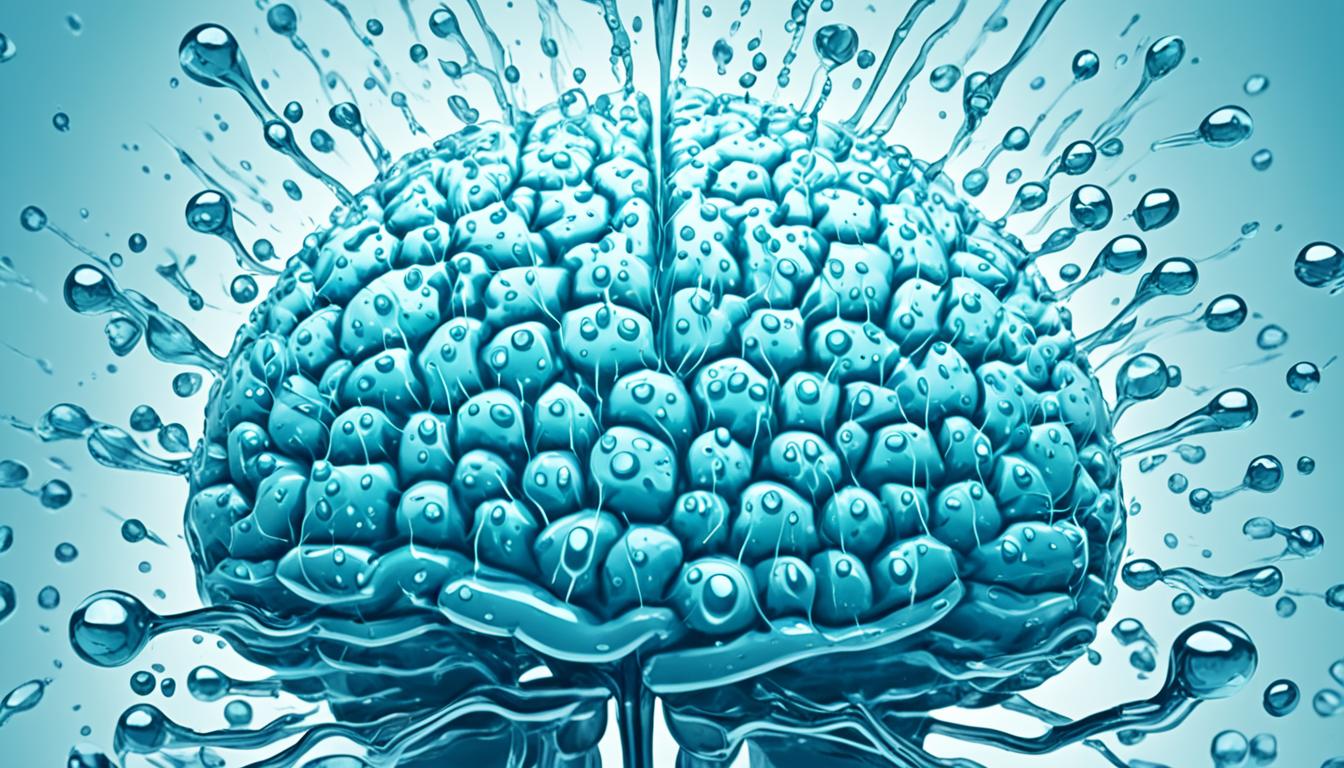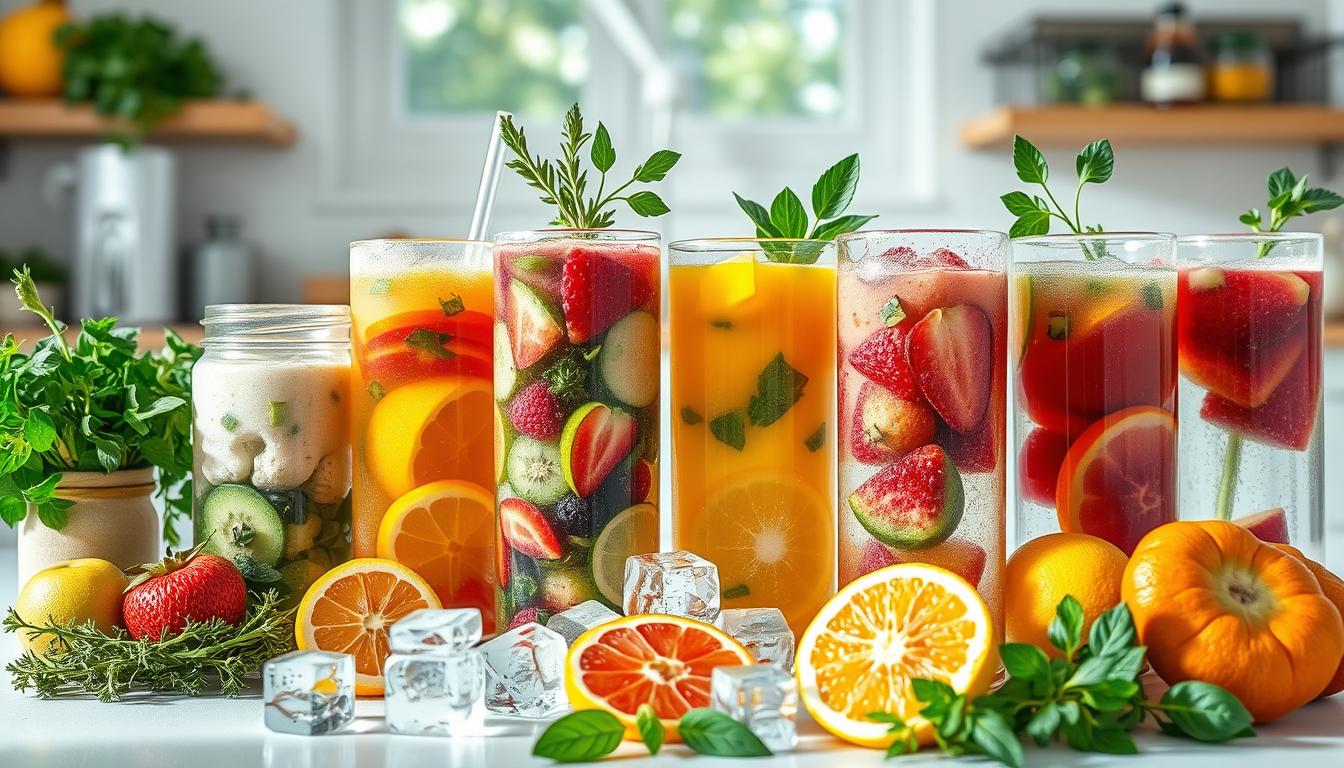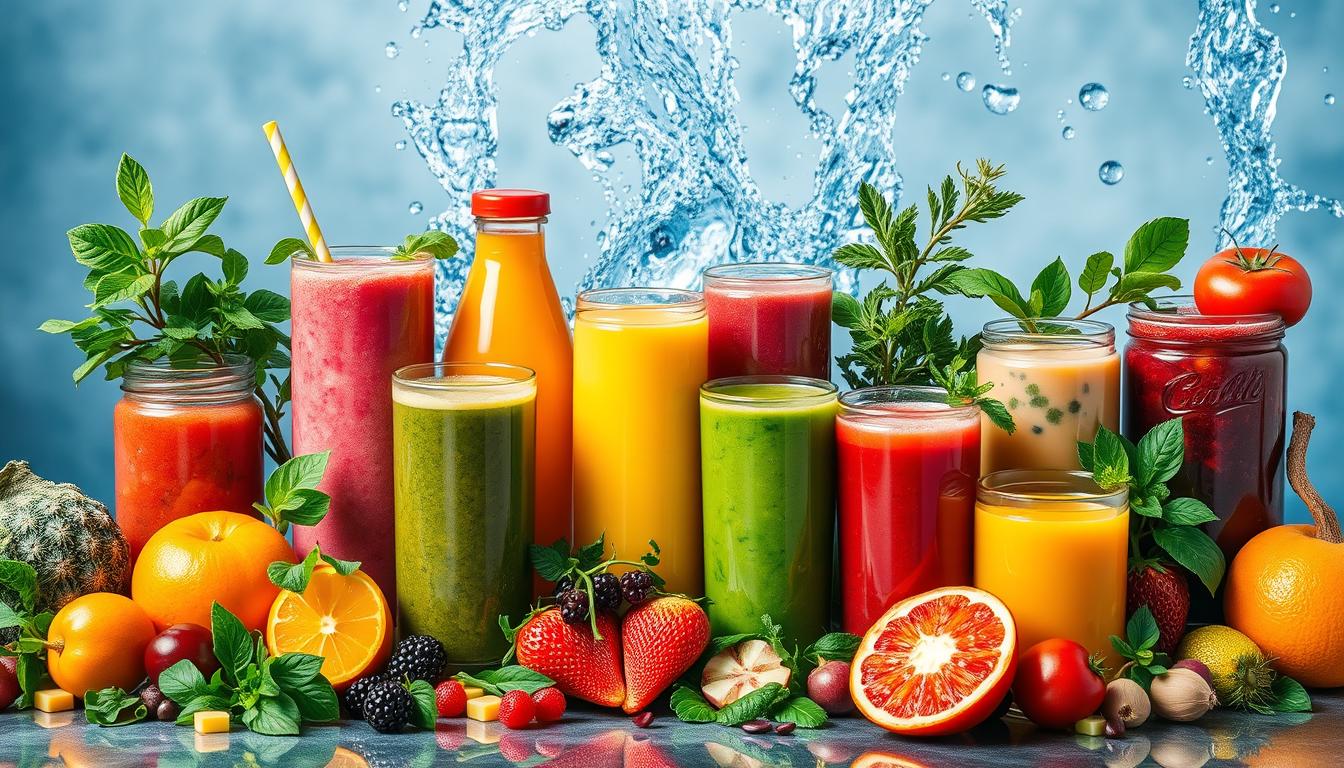Staying hydrated is key to clear thinking. Shockingly, most Americans don’t drink enough water. This can really hurt how well our brains work and our mental sharpness. Water helps our brains work better, improving memory and focus. Even a little less water than we need can make it tough to concentrate and cause problems with thinking.
Men should drink about 15.5 cups of water a day, while women need around 11.5 cups. To really get the benefits of staying hydrated, we must drink water regularly. Just a glass when you remember won’t cut it; we need to drink enough every day to think and feel our best.
Key Takeaways
- 75% of Americans do not drink enough water.
- Recommended daily water intake is around 11.5 cups for women and 15.5 cups for men.
- Dehydration is linked to impaired cognitive function and memory issues.
- Even mild dehydration can affect concentration and cause brain fog.
- Consistently meeting daily fluid intake is essential for mental acuity.
The Importance of Water for Brain Function
Water is crucial for brain health. It plays a big role in how we think and process information. The brain is mostly made of water, over 70%. This shows just how important hydration is for it to work well. Keeping hydrated helps us concentrate and think clearly.
How Dehydration Affects Cognitive Performance
Not drinking enough water can hurt how well we think. Even being a little dehydrated impacts how our brain functions. Studies, like the one from Armstrong et al. (2012), found that mild dehydration messes with mood and thinking. Another study, by Ganio et al. (2011), showed the same in men. So, staying hydrated is vital for our brains to work their best.
Zhang et al.’s (2017) work did a test in China. They looked at how water affected thinking and mood in college men. Their study showed that 400 mL of extra water made a big difference. It helped fight off the bad effects of not drinking enough.
Fluid Intake Recommendations for Optimal Brain Health
For good brain health and sharp thinking, women should drink 11.5 cups of water a day. Men need even more, around 15.5 cups. These amounts help our brains stay in top shape. They lower the risk of memory problems and thinking struggles. It’s clear that water is key for our brains to work well.
Lacking water slows down our brain’s thinking power. For older adults, staying hydrated is even more crucial. It helps avoid memory loss and thinking problems. We should always remember the importance of water for our brain’s health.
The Link Between Hydration and Mental Clarity
Staying hydrated is crucial for clear thinking. It affects how we feel and how well we think. Studies show drinking enough water makes kids do better in school.
Even mild dehydration can change our mood and make it hard to think. Just a 1% drop in hydration can hamper our thoughts by 5%. And a 2% drop can cause memory problems and make math harder.
Our bodies are mostly made of water. So, it’s clear that drinking enough water helps us focus better. Many healthy adults and children don’t drink as much water as they should.
“The benefits of drinking water for brain health extend beyond basic hydration, playing a crucial role in maintaining energy levels, cognitive functions, and overall mental performance.”
Not getting enough water can really hurt our brains. Too much or too little water, often from exercise or hot weather, can make us slow to think. This is especially bad for older people, as it might even make their brain cells shrink.
Not getting enough sleep or being too hot, not eating enough, and being dehydrated can really make us foggy. Good water intake is linked to sharper minds. In Zambia, giving water to schoolchildren improved their thinking skills. It shows how important water is for our brains.
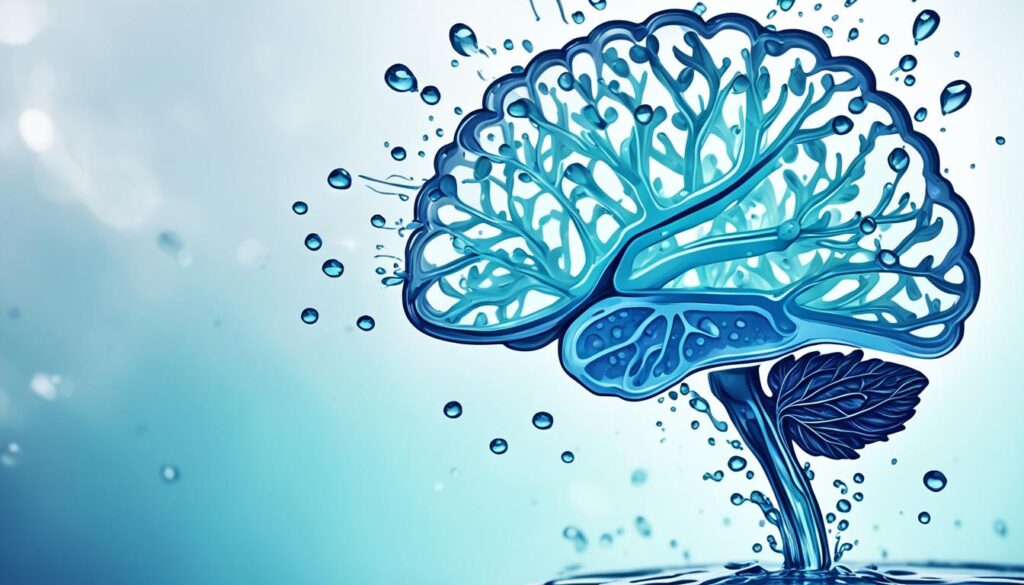
People in countries like China and the USA don’t always drink the right amount of water. This can mess with our thinking. It’s important to pay attention to how much water we drink. Choosing water over sugary drinks and eating plenty of fruits and veggies helps our brains work better.
Cognitive Benefits of Staying Hydrated
Water makes up 75% of the brain. Keeping hydrated is key for the mind. It boosts short-term memory, makes you focus longer, and helps during stress. Lack of water, even a little, can hurt how well you think. It messes with your memory, focus, and more. Studies show it. Also, if you go 16 hours without water, your brain shrinks a bit. But, it grows back right after you drink some.
Clear thinking and water go hand in hand. Drinking enough can fight off heat stress and bad moods. For example, 68 college students got smarter after drinking 400 mL of water. In China, kids did better in school when they drank more water.
Drinking water is great for your body, too. It helps muscles work well. Not drinking enough can make you tired and weak. So, keep drinking to stay sharp and feel awake. It’s important for your daily life and for your brain health in the long run.
| Study/Statistic | Result |
|---|---|
| Water accounts for brain mass | 75% |
| Decreased brain volume after 16 hours without water | 0.55% |
| Increased brain volume after rehydration | 0.72% |
| Fluid replacement attenuates physiological strain | Without impacting cognitive performance |
| Supplementary water intake in schools (China study) | Increase in cognitive performance |
Hydration and Mood Regulation
It’s crucial to understand the deep connection between how hydrated we are and how we feel. Keeping hydrated helps the brain make serotonin. This chemical is vital for our mood.
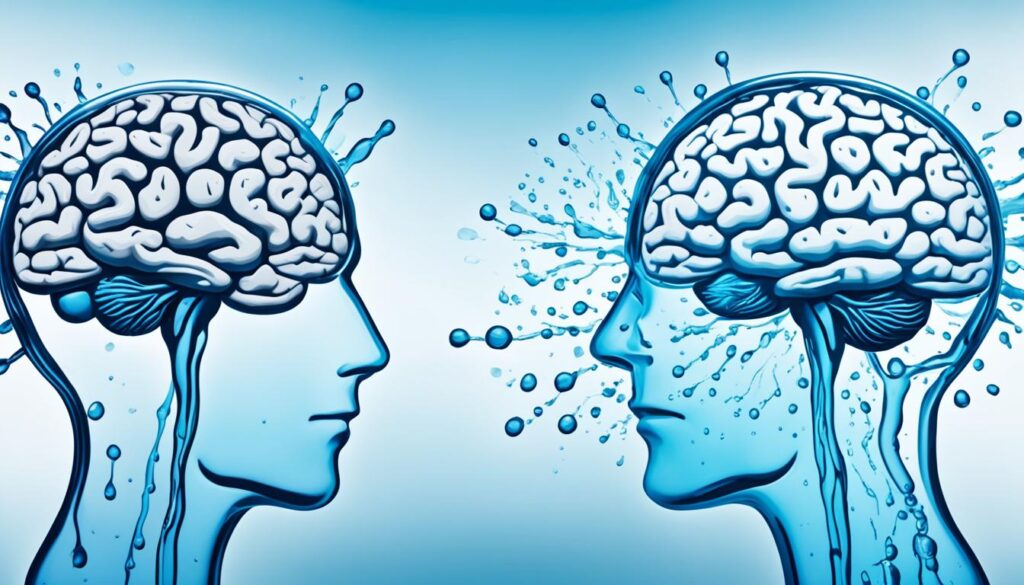
Serotonin Production and Hydration
Serotonin is known as the “feel-good” hormone. To make enough of it, we must drink plenty of water. If we don’t drink enough, our mood can suffer. This can lead to issues like depression. So, drinking enough water is key for our mental health.
Dehydration’s Impact on Anxiety and Depression
If you’re dehydrated, you might actually feel more anxiety and depression. Studies show that not drinking enough water can mess with your mind. For example, it can make young women feel down and take a toll on men’s thinking skills. People who drink two or fewer glasses of water a day are more likely to be depressed. But, those who drink five or more reduce this risk. This proves how vital water is for managing your mood.
The following table highlights the impact of hydration on mood regulation:
| Hydration Status | Mood Impacts | Population & Study |
|---|---|---|
| Dehydrated | Increased anxiety and depression | Young women and men, college-aged males in China |
| Well-hydrated (10.5 cups/day) | Greater mental flexibility | U.S. children ages 9 to 11 |
| Less than 2 glasses/day | Higher risk of depression | More than 3,000 Iranian adults |
| More than 5 glasses/day | Reduced risk of depression | More than 3,000 Iranian adults |
By staying well-hydrated, you help your body make more serotonin. This can make a big difference in how you feel. It can protect you from mood problems.
Practical Tips for Staying Hydrated
Staying hydrated is important for our health. By forming good habits and knowing how much water to drink, we can feel better every day.
Daily Water Intake Guidelines
The Academy of Nutrition and Dietetics suggests women drink about 9 cups daily. For men, the goal is roughly 12.5 cups. But, your needs might be different based on your activity, the weather, and your health.
If you’re not drinking enough water, you might feel thirsty, have a dry mouth, or see dark urine. Kids may show dehydration through fussiness, tiredness, and dry diapers. It’s vital to watch out for these signs.
Simple Habits to Boost Water Consumption
You can drink more water by adding easy tips to your day. Start by noticing when your body tells you it’s thirsty. Then, drink a glass right when you wake up.
Buying a water bottle you can use over and over helps a lot. Setting alerts on your phone can remind you to drink water. Eating fruits and veggies that are full of water is another great way to stay hydrated.
By keeping an eye on how much water you drink, you can avoid feeling anxious. Plus, you’ll feel better overall.
Choosing the Right Beverages
It’s key to pick drinks that keep you hydrated. Electrolyte water is a great choice, as it helps fight off dehydration and anxiety. Yet, be careful with drinks that have a lot of caffeine or alcohol. They can dry you out instead.
Adding fruit slices to your water not only makes it taste better but can also increase how much you drink. This makes staying hydrated more fun!
Conclusion
The link between drinking enough water and clear thinking is strong. It’s vital to always keep hydrated for good cognitive function, mood, and brain health. Even a little dehydration can reduce brainpower and affect how we feel, hitting men and women differently. For instance, it can make young women feel down and make tasks harder for men.
Drinking enough water matters a lot to kids and those who play sports too. It helps young kids do better in school and athletes perform their best. Not drinking enough water makes older people’s minds slow down. So, every age group needs to focus on staying hydrated for sharp minds and improved daily function.
To sum up, drinking water is crucial for all ages. Our brain and body need a lot of water to work well. We all should make a plan to drink enough water every day. This way, we keep our minds sharp and feel good. So, being mindful about drinking water makes a big difference in how we think and feel.
## FAQ
### Q: How does dehydration affect mental clarity and cognitive performance?
Dehydration hampers mental clarity and cognition. It reduces focus, memory, and the ability to think. Even slight dehydration can lead to brain fog and poor concentration. This shows that being well-hydrated is crucial for sharp thinking.
### Q: What are the benefits of staying hydrated for mental clarity?
Keeping hydrated supports clear thinking by aiding brain functions. It boosts memory and thought processes. Drinking enough water helps prevent brain fog, improves focus, and enhances how well we think.
### Q: Why is water important for brain function?
Water plays a key role in brain health. It affects thinking and nerve functions. By drinking enough water, you help your brain work better, slowing down memory loss and improving decision-making.
### Q: What are the daily fluid intake recommendations for optimal brain health?
For sharp brain function, women need about 11.5 cups and men 15.5 cups of water each day. These amounts keep your brain working well and your thinking clear. It’s important to meet these hydration goals for your brain’s health.
### Q: How does proper hydration benefit cognitive functioning?
Being well-hydrated boosts how well your mind works. It helps memory, focus, and attention. When you’re hydrated, you perform better at tasks, even when under pressure. Water also keeps your mood and thinking positive by stopping dehydration’s bad effects.
### Q: Why is hydration important for mood regulation?
Hydration affects how your brain makes serotonin, a mood-stabilizing chemical. Without enough water, serotonin levels drop, leading to bad moods. This could increase the chance of feeling anxious or down.
### Q: How does dehydration impact anxiety and depression?
Dehydration can make anxiety and depression worse by raising stress hormones like cortisol. If you don’t drink enough, you’re more at risk for these mood problems. Drinking water is key for good mental health.
### Q: What are some practical tips for staying hydrated?
Simple ways to drink more water include: responding to thirst, having water in the morning, and using a refillable bottle. Set alerts, and link drinking water to habits. Adding fruits and herbs can make it tastier. Opt for water over drinks high in caffeine or alcohol.
### Q: What are the daily water intake guidelines for maintaining mental clarity?
For clear thinking, women are advised to drink 11.5 cups and men 15.5 cups of water a day. Following these amounts improves brain health and keeps thinking sharp, reducing the risk of cognitive issues.
### Q: How can one develop simple habits to boost water consumption?
To drink more water, carry a bottle and drink with meals. Use alerts, add fruits or herbs for taste, and pick water over drinks that dehydrate, like coffee or alcohol. This keeps you hydrated.

